The demand for cottonseed hulls in Japan is expected to expand from USD 29.2 million in 2025 to USD 37.6 million by 2035, reflecting a CAGR of 2.6%. Cottonseed hulls are widely used in animal feed, particularly for livestock, dairy cattle, and poultry, due to their high fiber content and nutritional benefits. Additionally, they are increasingly used in bioenergy production and as a biomass feedstock for biofuel production. As demand for sustainable feed ingredients and eco-friendly biomass sources continues to rise, cottonseed hulls are expected to see continued growth in these applications. Japan’s growing focus on sustainable agricultural practices and environmentally friendly feed alternatives will further support the market for cottonseed hulls.
The market for cottonseed hulls in Japan will benefit from increased livestock farming, expansion of bioenergy projects, and the rising adoption of renewable energy sources. Additionally, the increasing use of organic farming practices will drive the demand for natural feed components such as cottonseed hulls. Over the forecast period, the demand for cottonseed hulls will be driven by their versatility, cost-effectiveness, and environmental benefits, as well as their growing use in sustainable agriculture and energy production.
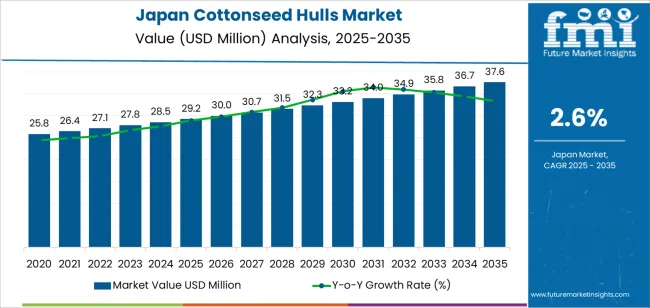
The contribution of volume vs price growth analysis for cottonseed hulls in Japan reveals the factors influencing the market expansion over the forecast period, focusing on how volume growth and price adjustments contribute to the overall increase in market value.
From 2025 to 2030, the market will grow from USD 29.2 million to USD 33.2 million, contributing USD 4 million in value. The primary driver of this growth is expected to be volume expansion, as demand for cottonseed hulls in animal feed and bioenergy increases. The volume growth will be supported by the rising demand for livestock and the growing adoption of sustainable feed alternatives. Price growth will contribute modestly during this phase, as the market remains competitive with other feed ingredients. The main drivers of market expansion in this period will be increased demand for organic and eco-friendly feed and the growing biofuel industry.
From 2030 to 2035, the market will grow from USD 33.2 million to USD 37.6 million, contributing USD 4.4 million in value. The growth in this phase will be driven by a combination of volume and price growth. While volume expansion will continue due to increasing demand from livestock farming and bioenergy production, price growth will play a larger role, as supply constraints and sustainable sourcing drive up the cost of cottonseed hulls. The price growth will be supported by increased adoption of sustainable agricultural practices and the growing cost of raw materials for bioenergy production. This phase will see a balance between volume growth from increased demand and price growth driven by the increasing cost of eco-friendly and renewable feedstock solutions.
| Metric | Value |
|---|---|
| Industry Sales Value (2025) | USD 29.2 million |
| Industry Forecast Value (2035) | USD 37.6 million |
| Industry Forecast CAGR (2025-2035) | 2.6% |
Demand for cottonseed hulls in Japan is influenced primarily by their use in animal feed and agricultural applications. Japanese feed manufacturers value cottonseed hulls for their high fibre content, which supports rumen health in ruminant animals and fits well into diets for dairy cows and beef cattle. At the same time, Japan’s limited domestic supply of cottonseed means that imports play a critical role; however, projections suggest that imports may shrink to about 96,000 metric tons in the forthcoming marketing year, partly due to softening feed demand in the dairy sector.
Another factor contributing to demand is the exploration of alternative uses for cottonseed hulls beyond feed, such as substrates for fungal cultivation, soil conditioners, and biomass applications. These emerging applications reflect broader interest in sustainable and circular economy materials. On the other hand, challenges exist: tight import supply chains, especially following recent shipping disruptions, and competing feed ingredient alternatives reduce growth potential. Despite these constraints, the steady requirement for fibre rich feed ingredients and novel agricultural uses suggest that demand for cottonseed hulls in Japan will remain stable, with selective growth depending on import accessibility and feed industry dynamics.
The demand for cottonseed hulls in Japan is driven by form and end-use segment. The leading form is bulk, which captures 73% of the market share, while the dominant end-use segment is fungal cultivation, accounting for 38% of the demand. Cottonseed hulls are a versatile agricultural by-product with a wide range of applications, particularly in agriculture and industrial processes. The demand for cottonseed hulls is driven by their use in cultivating fungi, animal nutrition, and their role in various industrial processes like furfural production and wastewater treatment.

Bulk form leads the market for cottonseed hulls in Japan, accounting for 73% of the demand. Bulk cottonseed hulls are preferred for their cost-effectiveness and ease of handling, especially in large-scale applications. They are commonly used in agricultural and industrial settings, where they are applied in quantities that require efficient storage and transportation.
The demand for bulk cottonseed hulls is driven by their widespread use in animal bedding, fungal cultivation, and as a biomass material in various industrial processes. Their ability to be used in bulk for composting, as a soil amendment, or in the production of animal feed makes them an attractive and affordable option for many industries. As more businesses and industries seek sustainable and natural raw materials, the demand for bulk cottonseed hulls remains strong in Japan.
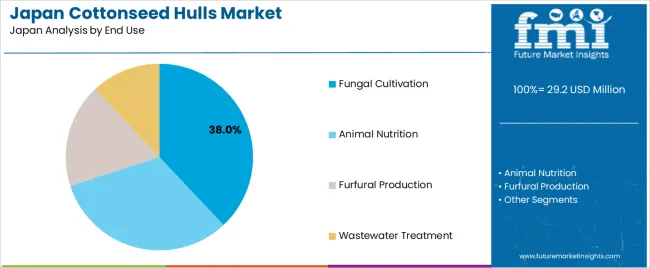
Fungal cultivation is the leading end-use segment for cottonseed hulls in Japan, accounting for 38% of the demand. Cottonseed hulls are widely used in the cultivation of fungi, particularly for edible mushrooms like shiitake and oyster mushrooms. The fibrous and nutrient-rich nature of cottonseed hulls makes them an ideal substrate for supporting fungal growth, as they retain moisture and provide the necessary texture and structure for mushrooms to thrive.
The popularity of cottonseed hulls in fungal cultivation is driven by the growing demand for mushrooms in Japan's food industry, particularly in the culinary and health food sectors. With the rising trend of plant-based and sustainable food options, the use of cottonseed hulls in cultivating high-quality mushrooms is expected to continue to grow. This trend, along with the cost-effectiveness of cottonseed hulls as a cultivation medium, ensures that fungal cultivation will remain a significant driver of demand in the cottonseed hull market in Japan.
What Are the Primary Growth Drivers for Cottonseed Hull Demand in Japan? Several drivers support growth in Japan’s market. First, Japan’s advanced livestock sector and dairy farms are searching for high fiber, cost effective feed inputs, positioning cottonseed hulls as a viable choice. Second, interest in fungal cultivation and growing demand for mushrooms and specialty crops in Japan create substrate uses for hulls. Third, sustainability pressures and circular economy initiatives encourage utilisation of agricultural by products like cottonseed hulls rather than waste disposal. Fourth, the Asia Pacific region is reported to be among the faster growing markets for cottonseed hulls, reflecting increasing uptake in Japan.
What Are the Key Restraints Affecting Cottonseed Hull Demand in Japan? Despite growth potential, some constraints exist. Domestic cottonseed production in Japan is minimal, so reliance on imported hulls increases cost and supply risk, limiting competitive advantage. Regulatory and quality certification requirements for feed inputs and substrate materials may raise barriers for new entrants. Some livestock producers may prefer more established feed fibers or conventional roughage sources, limiting switch over. Additionally, the incremental volume requirements may be modest given Japan’s smaller feed substitute market compared with large scale livestock nations.
What Are the Key Trends Shaping Cottonseed Hull Demand in Japan? Important trends include increasing interest in value added processing of cottonseed hulls (such as pelletised forms or treated substrates) to broaden the application beyond raw feed. There is growing integration of agricultural by products into sustainable feed systems, and hulls are being promoted as fibre enhancing ingredients for ruminants. Also, substrate demand for fungal cultivation is rising in Japan, opening non feed channels for hulls. Finally, data suggest Japan’s cottonseed hull market size is expected to grow toward USD 0.15 billion by 2033, indicating modest but steady demand trajectory.
The demand for cottonseed hulls in Japan is driven primarily by the growing agricultural and livestock sectors, where cottonseed hulls are used as a high-fiber animal feed, as well as a natural filler in various industrial applications. As a byproduct of cottonseed processing, cottonseed hulls are a sustainable, cost-effective alternative to other feed ingredients, making them attractive to farmers and livestock producers. Additionally, the rising awareness of sustainable farming practices and the increasing demand for organic and eco-friendly agricultural products are contributing to the demand for cottonseed hulls.
While the main use of cottonseed hulls in Japan is in animal feed, they are also used in organic composting, soil conditioning, and as a raw material in bioenergy production. The demand for cottonseed hulls is influenced by factors such as agricultural production levels, the growth of the livestock sector, and the availability of raw materials for feed production. Below is an analysis of the demand for cottonseed hulls across different regions in Japan.
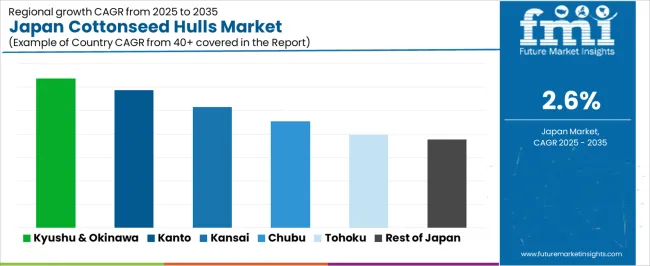
| Region | CAGR (2025-2035) |
|---|---|
| Kyushu & Okinawa | 3.2% |
| Kanto | 2.9% |
| Kinki | 2.6% |
| Chubu | 2.3% |
| Tohoku | 2% |
| Rest of Japan | 1.9% |
Kyushu & Okinawa leads the demand for cottonseed hulls in Japan with a CAGR of 3.2%. The region's strong agricultural sector, particularly in livestock farming and crop production, contributes to the higher demand for cottonseed hulls as animal feed. The large-scale use of cottonseed hulls in feeding livestock, especially in the southern agricultural regions of Kyushu, helps to support the overall demand for this byproduct.
Additionally, Kyushu & Okinawa's focus on sustainable agricultural practices and organic farming further drives the use of cottonseed hulls in soil conditioning and composting. The region's emphasis on environmentally friendly and cost-effective farming solutions supports the continued growth in the demand for cottonseed hulls. As the region's agricultural production expands and its farming practices become increasingly eco-conscious, the demand for cottonseed hulls is expected to remain strong.
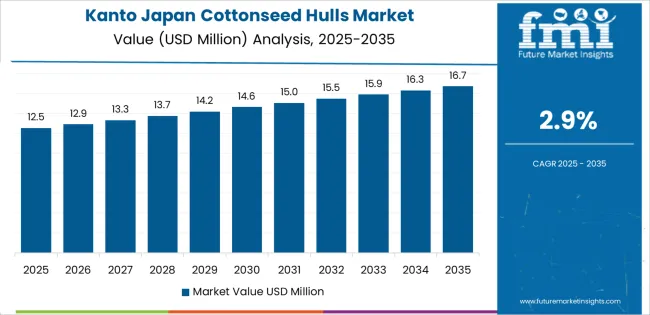
Kanto shows strong demand for cottonseed hulls with a CAGR of 2.9%. As Japan's economic and industrial hub, Kanto has a significant agricultural and livestock sector, particularly in rural areas outside Tokyo. The region’s demand for cottonseed hulls is driven by its use in animal feed and organic farming, where livestock producers are increasingly adopting sustainable feed alternatives like cottonseed hulls.
The growing trend towards organic farming and environmentally sustainable agricultural practices in Kanto further supports the demand for cottonseed hulls. With the rise in consumer demand for organic food products, more farmers are turning to natural alternatives like cottonseed hulls for soil enrichment and animal feed. Kanto's large agricultural production base and increasing focus on sustainable farming make it a key region for cottonseed hull consumption.
Kinki, with a CAGR of 2.6%, shows steady demand for cottonseed hulls. The region, which includes Osaka, Kyoto, and Kobe, has a strong agricultural and livestock industry, although it is less focused on farming compared to regions like Kyushu. Kinki’s demand for cottonseed hulls is driven by their use in animal feed, particularly for poultry and other livestock, as well as in organic farming for soil conditioning.
The steady growth in Kinki can be attributed to the region’s ongoing adoption of sustainable agricultural practices and the increasing popularity of organic farming methods. As Kinki continues to integrate sustainable and cost-effective farming solutions, the demand for cottonseed hulls will remain consistent, even though the growth rate is slower compared to other regions like Kyushu & Okinawa.

Chubu demonstrates moderate growth in the demand for cottonseed hulls with a CAGR of 2.3%. The region has a significant industrial base, and while it is not as prominent in agriculture as Kyushu or Kinki, there is still a steady demand for cottonseed hulls in the livestock sector. Chubu’s growing agricultural production, especially in the areas surrounding Nagoya, supports the continued use of cottonseed hulls in animal feed and organic farming applications.
Although the demand is not as strong as in other regions, Chubu’s emphasis on environmentally conscious farming and increasing awareness of sustainable farming practices are contributing factors to the moderate growth in cottonseed hull consumption. As the region continues to focus on improving its agricultural output and embracing eco-friendly practices, the demand for cottonseed hulls is expected to grow gradually.
Tohoku, with a CAGR of 2.0%, and the Rest of Japan, with a CAGR of 1.9%, show slower growth in the demand for cottonseed hulls. These regions are more rural and have fewer large-scale livestock operations and intensive agricultural activities compared to regions like Kyushu & Okinawa or Kanto. While there is still some demand for cottonseed hulls, particularly for use in smaller agricultural operations and organic farming, the overall market growth is slower.
The slower adoption of sustainable farming practices and the lower concentration of livestock farms in Tohoku and the Rest of Japan contribute to the slower demand growth. However, as awareness of sustainable farming solutions increases and agricultural practices continue to evolve, the demand for cottonseed hulls in these regions is expected to experience gradual growth.
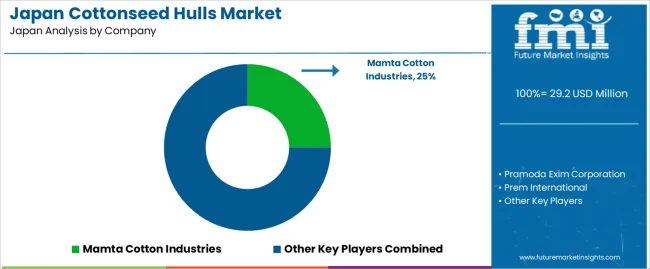
The demand for cottonseed hulls in Japan is increasing, driven by their use as an eco-friendly and cost-effective ingredient in animal feed, fertilizers, and as a raw material in various industrial applications. Companies like Mamta Cotton Industries (holding approximately 25% market share), Pramoda Exim Corporation, Prem International, Shree Ram Proteins Ltd., and SMM Traders are key players in this market. Cottonseed hulls are valued for their high fiber content and are used extensively in livestock feed to improve digestion, as well as in the production of organic fertilizers due to their ability to improve soil quality.
Competition in the cottonseed hulls market is driven by product quality, availability, and pricing. Companies focus on providing high-quality, clean, and processed cottonseed hulls that meet the nutritional needs of livestock and comply with the regulatory standards in agriculture. Another competitive factor is the ability to offer bulk supply, flexible packaging options, and reliable delivery for customers in Japan’s agricultural and industrial sectors.
Sustainability is also a key focus, as cottonseed hulls are a byproduct of cotton processing, making them a renewable and environmentally friendly option. Marketing materials typically highlight features such as high fiber content, nutritional benefits for animals, and applications in organic farming. By aligning their products with the growing demand for sustainable and cost-effective materials, these companies aim to strengthen their position in the Japanese cottonseed hulls market.
| Items | Details |
|---|---|
| Quantitative Units | USD Million |
| Regions Covered | Japan |
| Form | Bulk, Pellets |
| End Use | Fungal Cultivation, Animal Nutrition, Furfural Production, Wastewater Treatment |
| Key Companies Profiled | Mamta Cotton Industries, Pramoda Exim Corporation, Prem International, Shree Ram Proteins Ltd., SMM TRADERS |
| Additional Attributes | The market analysis includes dollar sales by form and end-use categories. It also covers regional demand trends in Japan, particularly driven by the need for cottonseed hulls in industries like fungal cultivation, animal nutrition, and wastewater treatment. The competitive landscape highlights key players in the cottonseed hulls market, focusing on innovations in production and processing. Trends in the growing demand for sustainable and cost-effective raw materials for various applications are explored, along with advancements in furfural production and environmental benefits in wastewater treatment. |
The global demand for cottonseed hulls in japan is estimated to be valued at USD 29.2 million in 2025.
The market size for the demand for cottonseed hulls in japan is projected to reach USD 37.6 million by 2035.
The demand for cottonseed hulls in japan is expected to grow at a 2.6% CAGR between 2025 and 2035.
The key product types in demand for cottonseed hulls in japan are bulk and pellets.
In terms of end use, fungal cultivation segment to command 38.0% share in the demand for cottonseed hulls in japan in 2025.






Our Research Products

The "Full Research Suite" delivers actionable market intel, deep dives on markets or technologies, so clients act faster, cut risk, and unlock growth.

The Leaderboard benchmarks and ranks top vendors, classifying them as Established Leaders, Leading Challengers, or Disruptors & Challengers.

Locates where complements amplify value and substitutes erode it, forecasting net impact by horizon

We deliver granular, decision-grade intel: market sizing, 5-year forecasts, pricing, adoption, usage, revenue, and operational KPIs—plus competitor tracking, regulation, and value chains—across 60 countries broadly.

Spot the shifts before they hit your P&L. We track inflection points, adoption curves, pricing moves, and ecosystem plays to show where demand is heading, why it is changing, and what to do next across high-growth markets and disruptive tech

Real-time reads of user behavior. We track shifting priorities, perceptions of today’s and next-gen services, and provider experience, then pace how fast tech moves from trial to adoption, blending buyer, consumer, and channel inputs with social signals (#WhySwitch, #UX).

Partner with our analyst team to build a custom report designed around your business priorities. From analysing market trends to assessing competitors or crafting bespoke datasets, we tailor insights to your needs.
Supplier Intelligence
Discovery & Profiling
Capacity & Footprint
Performance & Risk
Compliance & Governance
Commercial Readiness
Who Supplies Whom
Scorecards & Shortlists
Playbooks & Docs
Category Intelligence
Definition & Scope
Demand & Use Cases
Cost Drivers
Market Structure
Supply Chain Map
Trade & Policy
Operating Norms
Deliverables
Buyer Intelligence
Account Basics
Spend & Scope
Procurement Model
Vendor Requirements
Terms & Policies
Entry Strategy
Pain Points & Triggers
Outputs
Pricing Analysis
Benchmarks
Trends
Should-Cost
Indexation
Landed Cost
Commercial Terms
Deliverables
Brand Analysis
Positioning & Value Prop
Share & Presence
Customer Evidence
Go-to-Market
Digital & Reputation
Compliance & Trust
KPIs & Gaps
Outputs
Full Research Suite comprises of:
Market outlook & trends analysis
Interviews & case studies
Strategic recommendations
Vendor profiles & capabilities analysis
5-year forecasts
8 regions and 60+ country-level data splits
Market segment data splits
12 months of continuous data updates
DELIVERED AS:
PDF EXCEL ONLINE
Cottonseed Meal Market Analysis by Product Type, Nature and End Use Industry Through 2025 to 2035
Cottonseed Oil Market Analysis – Size, Share & Forecast 2025-2035
Cottonseed Hulls Market Analysis by Form, End Use, and Region through 2025 to 2035
Carbon Fiber Boat Hulls Market Size and Share Forecast Outlook 2025 to 2035
Japan Faith-based Tourism Market Size and Share Forecast Outlook 2025 to 2035
Japan Sports Tourism Market Size and Share Forecast Outlook 2025 to 2035
Japan Respiratory Inhaler Devices Market Size and Share Forecast Outlook 2025 to 2035
Japan Halal Tourism Market Size and Share Forecast Outlook 2025 to 2035
Japan Automated People Mover Industry Size and Share Forecast Outlook 2025 to 2035
Japan Automotive Load Floor Industry Analysis Size and Share Forecast Outlook 2025 to 2035
Japan Food Cling Film Market Size and Share Forecast Outlook 2025 to 2035
Japan Polypropylene Packaging Films Market Size and Share Forecast Outlook 2025 to 2035
Japan Probiotic Yogurt Market is segmented by product type, source type, nature type, flavor type, fat content, sales channel and key city/province through 2025 to 2035.
japan Tortilla Market - Growth, Trends and Forecast from 2025 to 2035
Japan Cosmetics ODM Market Analysis - Size, Share & Trends 2025 to 2035
Japan Automotive Turbocharger Market Insights – Demand, Size & Industry Trends 2025–2035
Japan Yeast Market Insights – Demand, Size & Industry Trends 2025–2035
Japan Green and Bio-based Polyol Market Insights – Demand, Size & Industry Trends 2025–2035
Japan Natural Food Color Market Trends – Growth, Demand & Forecast 2025–2035
Japan Coated Fabrics Market Growth – Trends, Demand & Innovations 2025–2035

Thank you!
You will receive an email from our Business Development Manager. Please be sure to check your SPAM/JUNK folder too.
Chat With
MaRIA